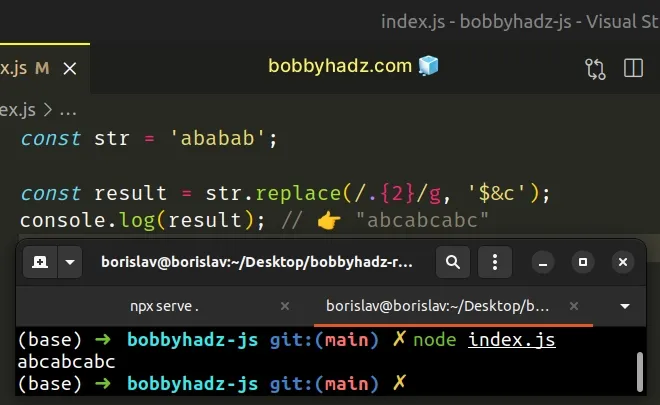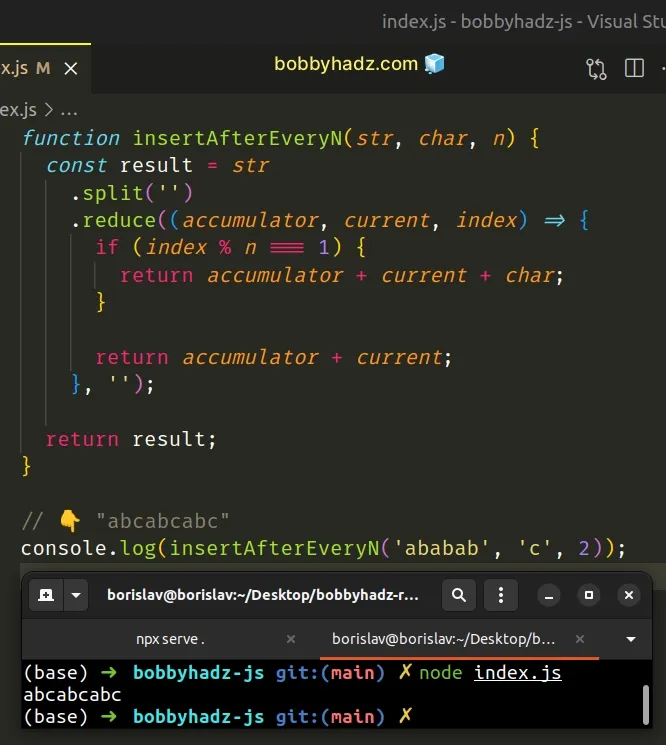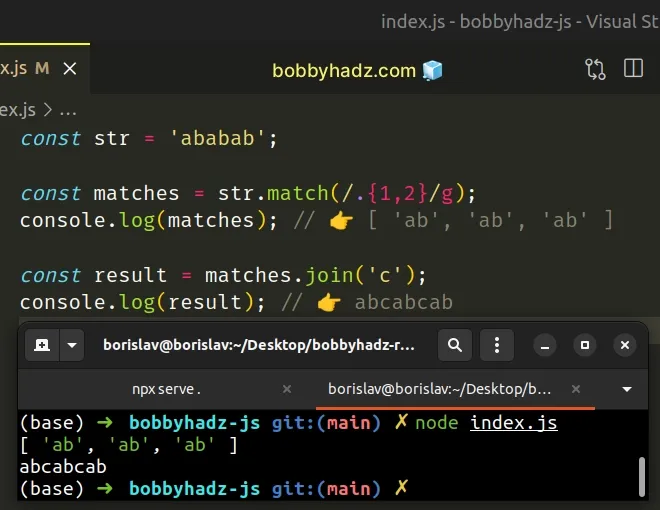Insert a Character after every N characters in JavaScript
Last updated: Mar 4, 2024
Reading time·4 min

# Insert a Character after every N Characters in JavaScript
To insert a character after every N characters, call the replace() method on
the string, passing it the following regular expression
str.replace(/.{2}/g, '$&c').
The replace method will replace every 2 characters with the characters plus
the provided replacement.
const str = 'ababab'; const result = str.replace(/.{2}/g, '$&c'); console.log(result); // 👉️ "abcabcabc"

The String.replace() method returns a new string with one, some, or all matches of a regular expression replaced with the provided replacement.
The method takes the following parameters:
| Name | Description |
|---|---|
| pattern | The pattern to look for in the string. Can be a string or a regular expression. |
| replacement | A string used to replace the substring match by the supplied pattern. |
Let's start with the second parameter - the replacement.
The replacement string can include special replacement patterns.
$& special pattern inserts the matched substring, to which we added the c character.const str = 'ababab'; const result = str.replace(/.{2}/g, '$&c'); console.log(result); // 👉️ "abcabcabc"
If we match ab and replace the match using $&c, we are effectively replacing
ab with abc.
The first argument we passed to the replace method is the regular expression.
The forward slashes / / mark the beginning and end of the regex.
The dot . is a special character and matches any single character.
We used the g (global) flag because we want to match all occurrences of any
2 characters and not just the first occurrence.
The replace method replaces every 2 characters with the 2 characters plus
the c character, allowing us to insert a character after every 2 characters
in the string.
# Insert a Character after every N characters using reduce
This is a four-step process:
- Split the string into an array.
- Use the
reduce()method to iterate over the array. - Check if the remainder of dividing the index by N is equal to
1. - If the condition is met, add the character to the end of the string.
function insertAfterEveryN(str, char, n) { const result = str.split('').reduce((accumulator, current, index) => { if (index % n === 1) { return accumulator + current + char; } return accumulator + current; }, ''); return result; } // 👇️ "abcabcabc" console.log(insertAfterEveryN('ababab', 'c', 2));

The first step is to split the string into an array of characters using the String.split() method.
// 👇️ ['a', 'b' ,'a' ,'b'] console.log('abab'.split(''))
The function we passed to the Array.reduce() method gets called for each element in the array.
accumulator variable is an empty string because that's what we provided as the second argument to the method.If dividing the index of the current iteration by N returns a remainder of 1,
then we have to insert the character.
Otherwise, we add the letter of the current iteration to the accumulated string and return the result.
The value we return from the callback function gets passed as the accumulator
on the next iteration.
# Insert a Character after every N characters using match
You can also use the match method to insert a character after every N
characters.
const str = 'ababab'; const matches = str.match(/.{1,2}/g); console.log(matches); // 👉️ [ 'ab', 'ab', 'ab' ] const result = matches.join('c'); console.log(result); // 👉️ abcabcab

The String.match() method matches a string against a regular expression.
The method returns an array containing the matches (if any) or null if no
matches are found.
The forward slashes / / mark the beginning and end of the regular expression.
The dot . is a special character and matches any single character.
The {n,m} syntax matches at least n and most m occurrences of the
preceding item (any character).
const str = 'ababab'; const matches = str.match(/.{1,2}/g); console.log(matches); // 👉️ [ 'ab', 'ab', 'ab' ]
Once we get an array of the matches, we join them with the characters we want to insert as the separator.
const str = 'ababab'; const matches = str.match(/.{1,2}/g); console.log(matches); // 👉️ [ 'ab', 'ab', 'ab' ] const result = matches.join('c'); console.log(result); // 👉️ abcabcab
The Array.join() method concatenates all of the elements in an array using a separator.
The only argument the Array.join() method takes is a separator - the string
used to separate the elements of the array.
If a value for the separator argument is omitted, the array elements are
joined with a comma ,.
If the separator argument is set to an empty string, the array elements are
joined without any characters in between them.
# Additional Resources
You can learn more about the related topics by checking out the following tutorials:

